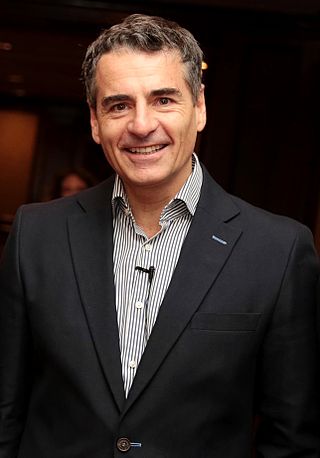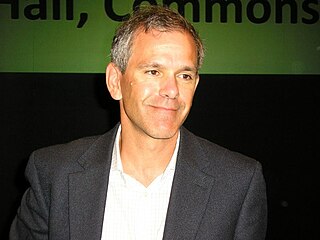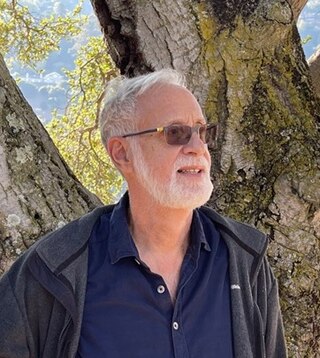Related Research Articles
An economist is a professional and practitioner in the social science discipline of economics.

The Hoover Institution is an American public policy think tank and research institution that promotes personal and economic liberty, free enterprise, and limited government. While the institution is formally a unit of Stanford University, it maintains an independent board of overseers and relies on its own income and donations. Fellowship appointments do not require the approval of Stanford tenure committees. It is widely described as a conservative institution, although its directors have contested its partisanship.

Jeffrey David Sachs is an American economist, academic, public policy analyst, and former director of The Earth Institute at Columbia University, where he holds the title of University Professor. He is known for his work on sustainable development, economic development, and the fight to end poverty.

Julio José Frenk Mora is president of the University of Miami and has served in this role since 2015. He is the University of Miami's first Hispanic and native Spanish-speaking president. At the University of Miami, he is also a professor of public health science at the university's Leonard M. Miller School of Medicine, professor of health sector management at the university's Herbert Business School, and professor of sociology at its College of Arts of Sciences.
The University of Washington Department of Global Health is a department jointly run by the schools of Medicine and Public Health at the University of Washington in Seattle, Washington. Its aim is to provide a multidisciplinary venue to address issues of global health at the university.
The Global Burden of Disease Study (GBD) is a comprehensive regional and global research program of disease burden that assesses mortality and disability from major diseases, injuries, and risk factors. GBD is a collaboration of over 3600 researchers from 145 countries. Under principal investigator Christopher J.L. Murray, GBD is based out of the Institute for Health Metrics and Evaluation (IHME) at the University of Washington and funded by the Bill and Melinda Gates Foundation.

Andrés Velasco Brañes is a Chilean economist and professor who served as Minister of Finance in the first government of President Michelle Bachelet from March 2006 to March 2010. He is currently the Dean of the School of Public Policy at the London School of Economics.

Michał Rutkowski is a Polish economist and a World Bank Global Director for Social Protection, Labor and Jobs in Washington, DC. He was recently a Director for Multilateral Organizations (2015–16) and before he was World Bank Country Director for the Russian Federation and a Resident Representative in Moscow (2012–15). He is a former Director for human development in the South Asia region of the World Bank. He is the highest-ranked Polish official at the World Bank headquarters in Washington, DC, and also a former Director of the Office for Social Security Reform in the Government of Poland (1996–97), as well as a co-author of the design of the new Polish pension system. A graduate of the Warsaw School of Economics, with post-graduate studies at the London School of Economics (1989–90) and Harvard Business School (1999). Before joining the World Bank in 1990 Rutkowski was an assistant professor at the Warsaw School of Economics and did research work in the area of labor economics, macroeconomics, education, business development and productivity in the Centre for Labour Economics and the Centre for Economic Performance at the London School of Economics. As a member of the secretariat of the Consultative Economic Council to the Polish government he also advised on early issues of economic and social transition to a market economy in Poland. He was also involved in interdisciplinary development endeavors as a member of the Polish Association for the Club of Rome and the British Association for the Club of Rome.

Christopher Murray is an American physician, health economist, and global health researcher. He is a professor at the University of Washington in Seattle, where he is Chair of Health Metrics Science and the director of the Institute for Health Metrics and Evaluation (IHME).

The Institute for Health Metrics and Evaluation (IHME) is a research institute working in the area of global health statistics and impact evaluation at the University of Washington in Seattle. The Institute is headed by Christopher J.L. Murray, a physician and health economist, and professor at the University of Washington Department of Global Health, which is part of the School of Medicine. IHME conducts research and trains scientists, policymakers, and the public in health metrics concepts, methods, and tools. Its mission includes judging the effectiveness and efficacy of health initiatives and national health systems. IHME also trains students at the post-baccalaureate and post-graduate levels.

The International Growth Centre (IGC) is an economic research centre based at the London School of Economics, operated in partnership with University of Oxford's Blavatnik School of Government.

Sameh El-Saharty is an Egyptian medical doctor and global health expert, who works as Lead Health Policy Advisor at The World Bank in Washington, DC. Dr. El-Saharty joined the Bank in 1998 and was the first Egyptian to work in the health, population, and nutrition (HNP) sector at the World Bank since its establishment. During this period, he was responsible for leading the health policy dialog and health strategy development for client countries as well as managing several programs and projects amounting to more than $3.5 billion in more than 25 countries in three world regions. Before his current position, he was the Program Leader for Human Development, responsible for the HNP, education, social protection and labor markets in the Gulf Cooperation Council countries. He also held the position of Adjunct Assistant Professor of International Health at Georgetown University in Washington, D.C.

Agnes Binagwaho is a Rwandan pediatrician and co-founder and the former vice chancellor of the University of Global Health Equity (2017-2022). In 1996, she returned to Rwanda where she provided clinical care in the public sector as well as held many positions including the position of Permanent Secretary for the Ministry of Health of Rwanda from October 2008 until May 2011 and Minister of Health from May 2011 until July 2016. She has been a Professor of Global Health Delivery Practice since 2016 and a Professor of Pediatrics since 2017 at the University of Global Health Equity. She resides in Kigali.
The Disease Control Priorities Project (DCPP) is an ongoing project that aims to determine priorities for disease control across the world, particularly in low-income countries. The project is most well known for the second edition of the report Disease Control Priorities in Developing Countries.
Prabhat Jha is an Indian-Canadian epidemiologist currently working in the field of global health.
Robert Michael Hecht is an American global health policy and financing expert. Hecht is currently Founder and President of Pharos Global Health Advisors. He has previously held positions with the World Bank, UNAIDS, the International AIDS Vaccine Initiative, and Results for Development Institute. He serves as a lecturer at Yale University’s Jackson Institute for Global Affairs and is a clinical professor at the Yale School of Public Health. He has published on a range of topics in global health and development, with a special focus on the economics, financing, and policies for infectious diseases, nutrition, and broader health system reform. He has been an advisor to the President's Emergency Plan for AIDS Relief (PEPFAR), the World Health Organization, and UNITAID. Hecht holds a BA from Yale and a PhD from Cambridge University.
The Alliance for Surgery and Anesthesia Presence is a multidisciplinary society of surgeons, anesthesiologists, obstetricians and public health specialists organized to improve the delivery of surgical care, particularly in low and middle income countries. The body, named the Burden of Surgical Disease Working Group at its founding in 2007, was renamed in 2010. It became an international society in 2013 under the umbrella of the International Surgery Society.

The Julis-Rabinowitz Center for Public Policy and Finance (JRC) is a leading research center at the Princeton School of Public and International Affairs (SPIA) of Princeton University. Founded in 2011, the JRC primarily promotes research on public policy as it relates to financial markets and macroeconomics. The center has also expanded its research and teaching to multiple disciplines, including economics, operations research, political science, history, and ethics.

Mark Richard Cullen is a physician, scholar, and population health scientist known for his work in occupational medicine. As a professor at Yale and later Stanford University, his research focused on the social, environmental, behavioral and bio-medical determinants of morbidity and mortality in adults, with special emphasis on the role of workplace’in such matters.
Huw Pill is a Welsh economist, and the chief economist of the Bank of England since September 2021, succeeding Andy Haldane.
References
- 1 2 "Dean Jamison | University of Washington - Department of Global Health". globalhealth.washington.edu. Retrieved 2023-04-28.
- 1 2 Lane, Richard (2013). "Dean Jamison: Putting economics at the heart of global health". The Lancet. 382 (9908): 1871. doi:10.1016/S0140-6736(13)62613-6. PMID 24315167. S2CID 27520800.
- 1 2 Sachs, Jeffery (2001). "Macroeconomics and Health: Investing in Health for Economic Development" (PDF). Commission on Macroeconomics and Health: World Health Organization. Retrieved May 17, 2010.
- ↑ "Developing countries devote more funding to health, except many in sub-Saharan Africa | (e) Science News". esciencenews.com. Retrieved 2023-04-28.
- ↑ "This is a global threat as big as climate change". Washington Post. ISSN 0190-8286 . Retrieved 2023-04-28.